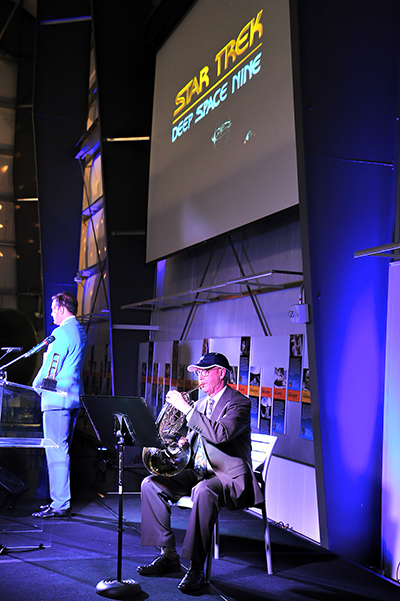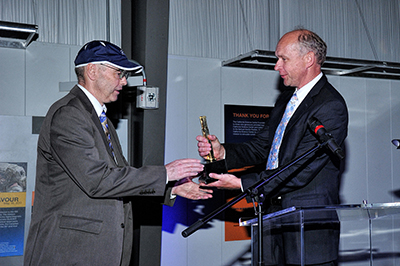
Horn player Brian O’Connor received the Tenacious Bravery Award at UCLA’s Golden Portal Awards July 12, where the two-time brain tumor survivor performed two of the horn solos he originally played on the TV series “Star Trek: Deep Space Nine” and “Star Trek: Generations.” Photo: Vince Bucci
Renowned horn player, two-time brain tumor survivor Brian O’Connor receives Tenacious Bravery Award from UCLA Medical Center
by Marie Matson and Linda A. Rapka
Internationally recognized French horn player and teacher Brian O’Connor boasts an impressive career. He has recorded more than 2,400 films, numerous television shows and records during his career as a first-call L.A. studio player. He served for seven years as president of the Recording Musicians Association of Los Angeles, and taught French horn at UCLA for 11 years.
But most impressive of all is the strength and bravery O’Connor has shown in overcoming a brain tumor and surgery — twice.
He underwent surgery for his first brain tumor in December 2004. After two other hospitals he consulted painted a grim picture, he met with Dr. Linda Liau at UCLA Medical Center, who told him, “We take these tumors out all the time. You’ll be fine.” Innovative procedures were devised for a groundbreaking surgery, which included musical tests created by his colleague, David Duke, in conjunction with the surgical team. The musical and cognition tests were administered and developed by Dr. Susan Bookheimer, a former concert pianist, professor of psychiatry at UCLA, and leading-edge researcher in the area of neurological surgeries. She administered all of the tests to O’Connor while he was wide awake for several hours during a portion of the surgery. He was able to return to work just five weeks later. A documentary covering his journey and this unique procedure was broadcast on “Dateline NBC.”
In a routine annual MRI last December, Dr. Liau discovered a new tumor and recommended a second surgery for O’Connor as soon as possible. Again, numerous sophisticated diagnostic tests were performed in the months leading up to the surgery. A functional MRI was used to map Brian’s brain. This time, Dr. Patricia Walshaw (also a former pianist and violinist) administered the test. She and the rest of the UCLA neurological team wanted to pinpoint which parts of O’Connor’s brain control his musical abilities. Projected on the ceiling of the MRI chamber were various types of musical tasks, such as melodic sight-reading, orchestral excerpts, horn transposition (supplied by conductor Daniel Walshaw, Dr. Patricia Walshaw’s brother), and rhythmic sight reading (supplied by percussionist Marie Matson). O’Connor was instructed to perform these tasks in his head, in addition to performing music from memory, for 10 seconds at a time as his brain was scanned to create the map.

Two-time brain tumor survivor Brian O’Connor receives the Tenacious Bravery Award at UCLA’s Golden Portal Awards. Photo: Vince Bucci
O’Connor had his second surgery on March 20, again at UCLA, with his long-term neurosurgeon, Dr. Linda Liau. The surgery was highly successful and the tumor was able to be removed while preserving all musical function. O’Connor returned to work in late April, performing on the “Dawn of the Planet of the Apes” film score. While continuing to work, as well as drive, he subsequently underwent six weeks of chemotherapy and radiation treatments at UCLA.
On July 12, O’Connor was the guest of honor at the Golden Portal Awards benefitting UCLA’s Brain Tumor Program, where he received the Tenacious Bravery Award. Dr. Liau selected O’Connor for the award based both on his medical history and on his unwavering drive to quickly return to work and normal daily life. Dr. Susan Bookheimer was also honored at the event where she was presented with the Tenacious Discovery Award.
The Golden Portal Awards were launched in 2012 by Ted Gagliano, president of Feature Post Production at 20th Century Fox. Funds raised help advance the work of UCLA’s brain tumor researchers as they work to develop personalized brain tumor therapies. The newest and most promising therapy is a vaccine created from a patient’s own tumor that then trains the immune system to recognize and destroy their unique brain tumor cells. Dr. Liau developed the vaccine, and O’Connor is currently participating in the clinical trial.
The Golden Portal Awards also recognize and honor the art and science of film and medicine, and this year the event was held at the Samuel Oschin Space Shuttle Endeavour Pavilion at the California Science Center. As his personal tribute honoring the convergence of motion picture science and medical technology in his life, O’Connor performed two of the horn solos that he played on the “Star Trek” TV series: the main title from “Star Trek: Deep Space Nine,” and “Kirk’s Death” from “Star Trek Generations,” both composed by his dear friend of 20 years, Dennis McCarthy.
“I have worked very hard to come back to work on my horn,” O’Connor said. “My strength is back to normal, my high range is back, and I have been playing at the Hollywood Bowl this summer,” adding that he looks forward to continuing his beloved work in music. He is eternally grateful to Dr. Liau and her team in the UCLA Brain Tumor Department for saving his life through their cutting-edge technology and expertise, making it possible for him to continue his music career on the same high level as prior to his surgery.
